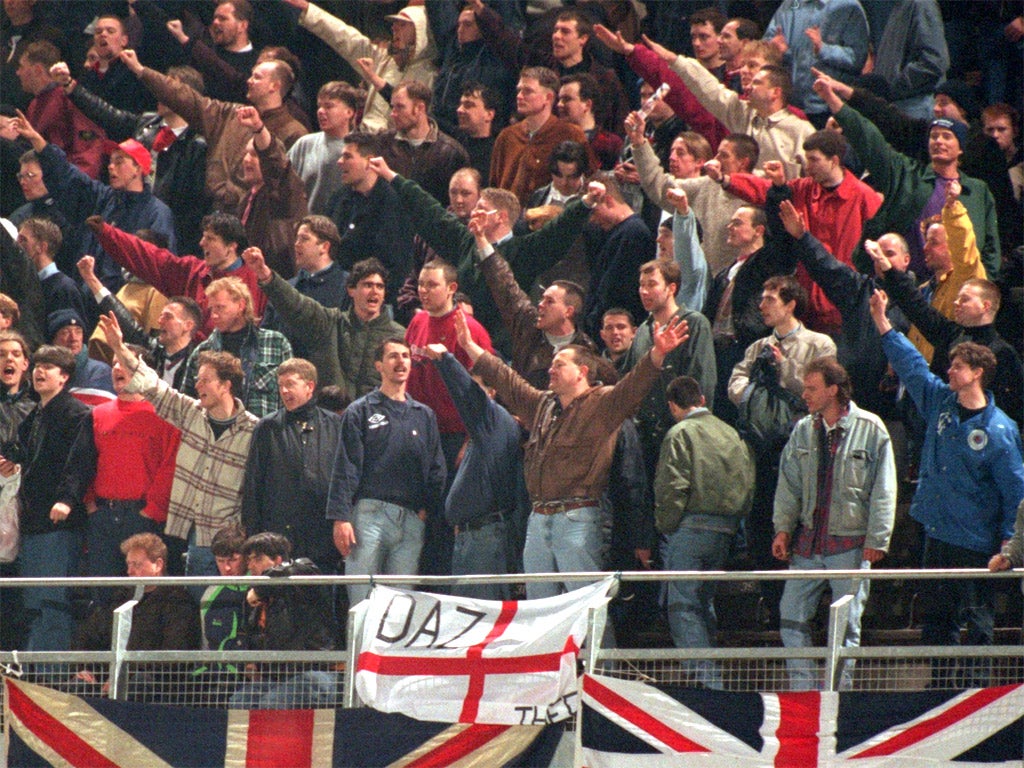James Lawton on England v Republic of Ireland: Here's hoping England's dark days are in the past
Every other nation had dealt with the problem. Why not England?

However much of it you had seen, the hooliganism that so coldly and systematically destroyed the last football match played between England and Ireland 18 years ago had a peculiar horror.
It was so dismissive, so contemptuous. Football meant nothing, or at least no more than the most vulnerable stage invaded by thugs with an entirely different purpose.
The innocent had to flee for their lives. Fathers had to protect sons from the missiles, which were mostly seats torn up in an old stadium which stored so many great memories.
On this occasion the beast had come out of its box at the bidding of the right-wing organisation Combat 18. The chants of 'Seig Heil' and 'No Surrender to the IRA' were fuelled more by orchestrated hate than the routine swilling of booze, and when the game was wiped out inside half an hour it was this that brought the sharpest despair.
England was just 18 months away from staging the second most important international tournament, the European Championships, and here was Terry Venables, the coach charged with renovating the national team shockingly excluded from the previous year's World Cup, shaking his head and saying, "Some days now you have to wonder about the point of football when it can be abused like it has been tonight."
Now it is comfortable to believe there will no such scarring tomorrow night when England and Ireland meet again, this time at the new Wembley rather than the old, ransacked Lansdowne Road, but Venables' successor Roy Hodgson is surely right to put every England fan on guard.
His call is for respect, not just for the Irish fans who have built an enviable reputation as arguably world football's most agreeable travellers since their English messiah Jack Charlton first gained entrance to the Euro and World Cup finals in 1988 and 1990, but for the game itself.
The call is timely in view of the brush some England fans had with claims against them of racial chanting at the recent World Cup qualifier in San Marino, and Hodgson has simply underlined the point that if there is one football nation on earth which cannot forget the need for vigilance it is England.
Dublin on 15 February, 1995, surely made the point for all time. A football match had been hijacked, a stadium had been trashed, and there is an enduring image of a young Irish boy, his father's protective arm around his shoulder, looking with apprehension and disbelief at the engulfing riot.
The chief executive of the Football Association, Graham Kelly, said he would assure Uefa that security would be redoubled for Euro 96 but he could not begin to dissipate an appalling sense of futility. England's captain David Platt was as disconsolate as his coach, saying: "I'm a footballer who likes to play on a rectangular pitch, but who wants to talk about football tonight?"
Venables added: "I don't think I've ever felt so empty in all my time in the game. Something like this makes you feel hollow, completely numb. We are supposed to be building towards a great tournament next year, something to make the whole country proud, but something like this happens. It's sickening that these people can come along and wreck everything in just a few minutes."
Such people are somewhat in abeyance now, of course, but this was no reason for Hodgson not to sound his warning and make his plea.
The horror certainly still had plenty of momentum after they cleaned up Lansdowne Road. The following year there was much good cheer and singing of "Football's Coming Home'' before England lost in the semi-final to Germany and then there was a riot in Trafalgar Square.
Two years later in the World Cup in France, Marseilles was besieged, the old port district becoming a battlefield – and Kelly again wore the expression of a man who could see no light in the darkness. "No, you cannot really see where it will end," he said in the stench of tear gas.
Two years later in the European Championships in Belgium, England were warned of possible expulsion – the first front rank nation to suffer such a threat with the then Uefa president, Lennart Johannson, declaring: "Every other nation has found a way of dealing with this problem – why not England?" The government was asked the same question with some ferocity after disgusting scenes in Brussels and Charleroi.
Why not England? Because an overwhelmed game and, more significantly, successive governments were so slow to react to the problem that began to emerge as early as the early Sixties and which a decade later provoked the great old Spurs manager Bill Nicholson to yell to rioting fans in the Feyenoord Stadium in Rotterdam: "You make me ashamed to be an Englishman."
We can only hope that Roy Hodgson has done enough to head off the merest hint of such old embarrassment at Wembley tomorrow night.
Subscribe to Independent Premium to bookmark this article
Want to bookmark your favourite articles and stories to read or reference later? Start your Independent Premium subscription today.

Join our commenting forum
Join thought-provoking conversations, follow other Independent readers and see their replies